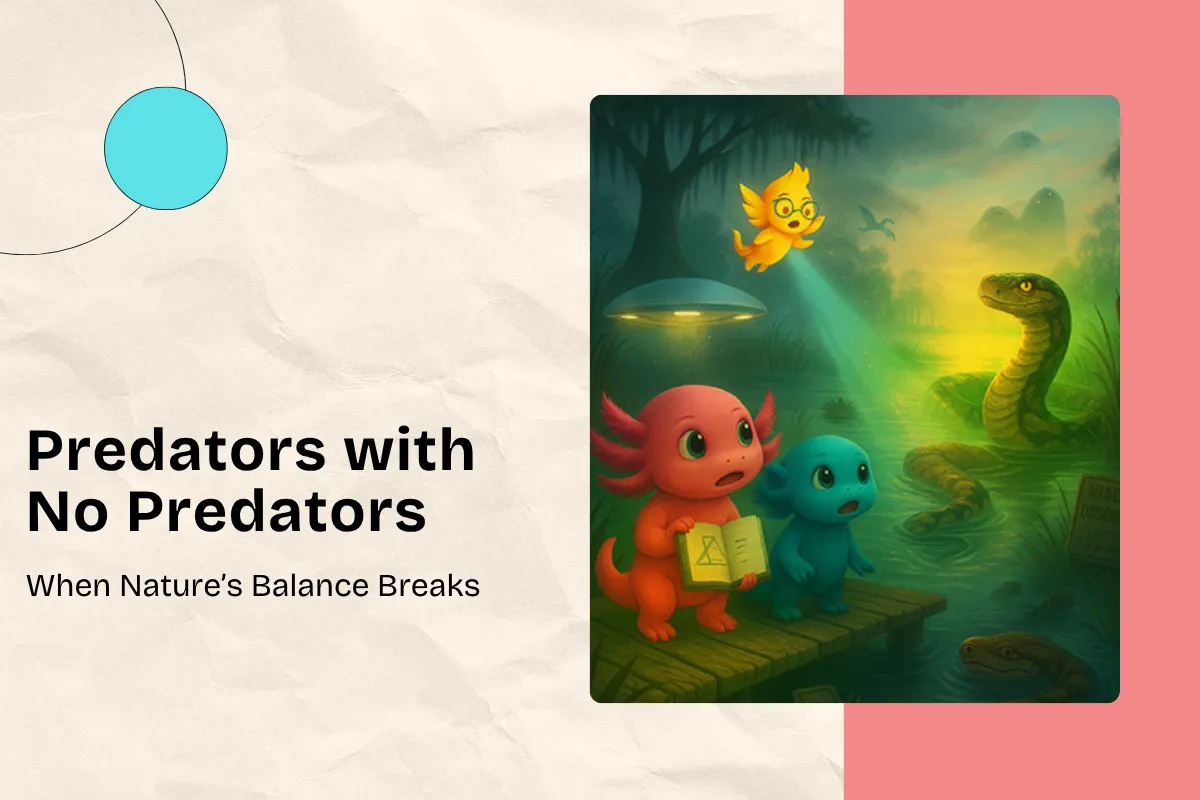
Predators with No Predators: When Nature’s Balance Breaks
🐊 Predators with No Predators: When Nature’s Balance Breaks
Florida’s Everglades are famous for balance—water, sun, and thousands of species each playing their part.
But that balance is shaking. The Burmese python, now firmly established, has become what scientists call an “apex invader.”
Lotty: “Wait—so now it’s the top of the food chain?”
Glowria: “Exactly. And when the top changes, everything below feels it.”
🐍 When the Hunter Becomes the Hunted … or Not
In its native Southeast Asia, the python competes with tigers, crocodiles, and large raptors.
In Florida? None of those predators exist. Once a python reaches adulthood—10 to 15 feet—it has no natural enemies.
That means the snakes eat freely and grow quickly.
Camera traps and research studies have recorded pythons swallowing deer, alligators, and even bobcats.
And while a single meal may last weeks, each one removes a vital piece from the Everglades food web.
Finn: “So the pythons aren’t just visiting the buffet—they are the buffet.”
🪶 The Ripple Effect
When small mammals vanish, other animals lose their meals too.
Owls and hawks lose prey.
Foxes and bobcats face starvation or leave the area.
Mosquitoes begin biting birds instead of mammals, spreading new diseases.
Plants suffer when seed-spreading mammals disappear.
Within just 20 years, scientists have measured up to 99% declines in some mammal populations inside python-dense zones.
Glowria: “One uninvited guest can silence an entire choir.”
💡 Science Spotlight: Apex Predators and the Food Web
Every ecosystem has top-level predators that keep populations in check.
Remove—or replace—them, and balance collapses.
The python became an accidental replacement, pushing out native apex predators like the American alligator.
A healthy food web looks like a pyramid: many plants at the bottom, fewer prey animals, and even fewer predators.
When one predator multiplies beyond control, the pyramid flips—unstable and unsustainable.
Lotty: “So it’s like stacking stones wrong — eventually they topple.”

🔍 Trying to Restore Balance
Florida’s wildlife teams are working hard to slow the invasion:
Python Patrols: Trained experts remove snakes year-round.
Public Challenges: Events like the Florida Python Challenge encourage safe citizen participation.
Radio Tracking: “Scout snakes” with transmitters lead scientists to nests.
Predator Research: Alligators and bobcats sometimes fight back—offering clues to possible natural limits.
Education Campaigns: Discouraging exotic-pet releases and promoting habitat protection.
Still, eradication remains impossible. Scientists focus on containment, data collection, and—most importantly—public awareness.
Glowria: “Balance begins when understanding spreads faster than the snakes.”
🌎 Lessons Beyond the Glades
What’s happening in Florida isn’t isolated. Around the world, invasive apex predators—like feral cats, lionfish, and cane toads—wreak similar havoc.
Each story reminds us that ecosystems are living systems, not empty spaces waiting to be filled.
Lotty: “Nature already wrote the script.”
Finn: “And we should stop adding extra characters without reading the ending.”
🐾 What We Can Do
Support wildlife-removal and restoration projects.
Report invasive species sightings to local authorities.
Teach kids why native animals matter.
Never release pets into the wild.
Small actions—especially shared widely—can rebuild balance over time.
✨ Coming Next
Part 4 – Restoring the Balance: Hopeful stories of scientists, volunteers, and explorers working together to protect the Forever Glades—and what that means for axolotls everywhere.
📚 Explore & Create
Turn this science into storytelling with Year of the Snake.
Imagine your own world where balance must be restored.
Follow or subscribe for more Science Spotlight adventures—perfect for #homeschool and #scienceforkids explorers!

PS: Lotty & Finn live in our imagination, where adventures are full of curiosity and fun! If you’re caring for real axolotls, always check with experts for proper guidance. Curious to dive deeper? Visit our Explorer Resources page for trusted sources and links. 🌊
